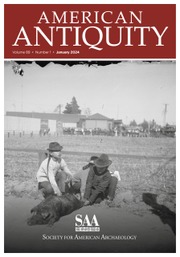Article contents
Ozymandias, King of Kings: Postprocessual Radical Archaeology as Critique
Published online by Cambridge University Press: 20 January 2017
Abstract
In Re-Constructing Archaeology (1987a) and Social Theory and Archaeology (1987b), Michael Shanks and Christopher Tilley argue for an antiscience radical archaeology as critique. They use deconstructionist sceptical arguments to conclude that there is no objective past and that our representations of the past are only texts that we produce on the basis of our sociopolitical standpoints. In effect, they contend that there is no objective world, that the world itself is a text that human beings write. This is a form of subjective idealism. Their critique is a nihilistic attack on all objective knowledge.
Résumé
En Re-Constructing Archaeology (1987a) y en Social Theory and Archaeology (1987b), Michael Shanks y Christopher Tilley proponen, como crítica, una arqueología radical y anticientífica. Usando argumentos escépticos “de-construccionistas,” Shanks y Tilley concluyen que no existe unpasado objetivo y que nuestras representaciones del pasado son sólo textos que producimos en base a nuestra posición sociopolítica. De hecho, ellos afirman que no existe un mundo objetivo y que el mundo mismo es un texto escrito por los seres humanos. Este es un tipo de idealismo subjectivista. La crítica de Shanks y Tilley es un ataque nihilista a todo conocimiento objetivo.
- Type
- Articles
- Information
- Copyright
- Copyright © The Society for American Archaeology 1990
References
References Cited
- 32
- Cited by




